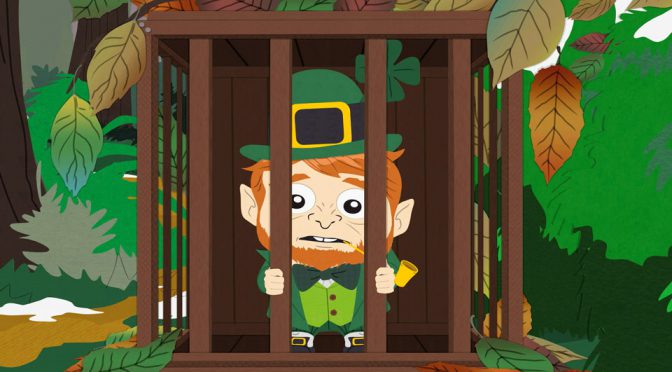As spring time rolls around and certain holidays come to pass, a few questions inevitably start popping up. Our modern holidays, inspired long ago by more ancient traditions, don’t make a lot of sense to us in our modern frames of reference. For instance, the Easter Bunny references a spring hare that traveled with some old European deities. Coloring eggs for Easter is part of an old Norse tradition representing the dawn. And, as for St. Patrick’s Day, there’s a whole lot we don’t fully understand about these little bastards.

The Leprechaun as we know them today have been changed repeatedly over the course of centuries. Beginning as part of Irish folklore, they’ve since become entwined with Irish stereotypes and traditions that have long since lost meaning. With even the origin of their name not being entirely clear, with some sources citing “little people” and others saying it was referring to their jobs as shoe cobblers, it makes sense they didn’t stay firm in all that time. Even the color they wear and the way they behave has been altered to suit contemporary mindsets over the ages. By this point, they’re essentially an inkblot test of how you feel about the Irish – for better or worse.
But one thing that hasn’t really changed much about Leprechauns over the ages is the fact that they are magical, lucky, and generally holders of great wealth. Some stories say this is due to their workaholic nature, acting in a miserly fashion and hoarding every coin they could possibly get. Others say that it’s due to their magical nature and ability to do things no human could. And some even say they found the treasures lost or buried by people and simply kept them. But all variations of this story generally have one unifying detail: If you can capture the little shits, they have to bargain their way free – potentially even giving you the location to their treasure (which is one of the few things they’re bound to tell the truth on).
Just one problem for you: they’re trickster spirits, and they’re not about to go down willingly.
Finding The Pot

Trapping a leprechaun, though not something many people would bother with, is still a pretty interesting part of the folklore and traditions. Few today would even consider it, save for children and their parents who treat it like the tooth fairy with their “leprechaun traps”, but stories of such events littered the Irish folklore for centuries. People would capture them, have them at their mercy, and then reach a bargain with the wee folk. Either they’d be given a single coin, a set of wishes, or the location to the actual pot of gold. But rarely do these stories actually go into depth about how exactly that would happen.
Because, frankly, how do you go about trapping a god?

Though creatures like Leprechauns are a fairly recent addition to the Irish folklore, the stories that originated them go back quite a ways. Many theorize that the earliest form of the Leprechaun were members of the Tuatha Dé Danann – the “tribe of the goddess Dana”. This tribe, central to old Irish religions, were the pantheon of Irish gods who featured prominently in all of their legends. However, as the region converted to Catholicism, not everything of the old religion disappeared and several figures remained in the local folklore and urban legends regardless. As such, Leprechauns were for all intents and purpose lesser deities with all of the abilities and importance that would entail. Because of this, being able to catch one was primarily based in blind luck rather than planning.
The traps themselves, beyond the fact they’re generally constructed by children, have little reason to work. Leprechauns, being trickster gods in the same vein as the likes of Loki, are naturally capable of getting in and out of almost anywhere with relative ease. And, on top of this, some early Leprechaun stories actually connected them back to water spirits, meaning they’re likely to escape anything that isn’t perfectly water tight. Though this trait has faded over time, their evolution over time actually made them more powerful rather than less as they essentially gained genie-like magic over the ages.

Some have claimed that there are certain methods that could work, such as using shiny objects to lure them in. And it is true that there are accounts that members of the Tuatha Dé Danann were attracted to shiny and precious objects. They were often depicted in glittering clothes adorned with various things they’d collected. However, while this could be used to provide a distraction or draw their attention, it no more caused them to stop being gods than anything else they would encounter. Recognizing this, some theories and stories have implied that specifically using silver would happen to give some leverage against these lesser nature deities – particularly by using silver string to ensnare them.
This, of course, stems from the common belief that silver had mystical powers over supernatural entities, but comes with a few issues. Firstly, the Tuatha Dé Danann are never implied to have this sort of weakness, so it wouldn’t make much sense for the Leprechauns to have it. Second, the metal most commonly impacting the fairy folk is iron, not silver. And third, back in the days before they were clothed all in green, Leprechauns were said to include silver buckles on their clothes – suggesting they’re actually pretty fond of the stuff.
So, in the end, only one thing is really said to have any effect on these entities and it’s a bit peculiar – maintaining eye contact. Though the lore doesn’t provide specifics about why this works, a potential cause does present itself. Generally only someone who believes in Leprechaun is said to be capable of even seeing or capturing one. As such, maintaining eye contact with them means it’s almost impossible you don’t currently believe in them, making them more “real” to you than they would be at any other time. If this were the case, it suggests that Leprechauns escape by sheer force of people not recognizing they’re there – a fascinating little implication for anyone who wants to believe there’s some magic in the world.

However, ignoring the great deals of luck and faith required to even get your eyes on one, that wouldn’t quite be the end of your ordeal. Let’s say you just so happened to catch one, the question would become: what then? Though the Leprechaun is bound to tell you the truth when asked about the location of their treasure in most lore, they’re not required to give that to you as their first offer. Rather, the Leprechaun is open to bargain with you however they please so long as they don’t go about lying to you in the process. A single coin is often an easy starting bid for their freedom, far cheaper than the whole pot, but something worse is often hiding in their pocket and many a fool took them up on it in the lore.
Being the powerful trickster that they are, one of the bargains they’d try to strike up would be to offer you three wishes like that aforementioned genie. This would sound to some to be a better opportunity, given that you could simply wish for a pot of gold as well, but comes at a greater price than all. Being a tiny little Loki with an ax to grind after being pinned down, all Leprechaun wishes are said to be straight up malicious. Some would believe that it’s a matter of incredibly careful wording, avoiding the old “make me a sandwich” mistake, but the truth is that the Leprechauns can basically curse anything you happen to get. Though you’d think there’d be ways past this, the truth is that even when you get exactly what you want, they can still ruin it. It happens in the real world all the time, after all.

So the verdict on trapping leprechauns is: don’t bother. Besides the fact they aren’t real, even if they were it’s probably biting off more than you could possibly chew. Though we’ve long ago turned them into benign little creatures linked to clovers and rainbows, the original lore said it was pretty much entering a battle of the wits with the forces of nature. Like capturing lightning in a bottle you wouldn’t really know how you did it, what to do next, or how to get out of it in one piece. And, sure, while there would be benefits to be had…
It’s probably a good thing it’s left to the realm of make-believe.
(I write novels and dabble in screenplays. If you’re looking for gold, feel free to check my twitter.)







